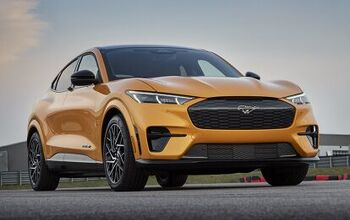Another Study Shows Consumers Hesitant to Embrace Mobility

With automakers investing heavily into the development of electrified and autonomous vehicles, it might seem there is a gigantic consumer base ready and raring to go out and buy them. But every study we’ve encountered suggests the exact opposite. Electric cars are still limited to tech fetishists with regular folks occasionally deciding to become early adopters. Meanwhile, AVs are still in their infancy with engineers keen to document every baby step they take as the public remains ill-informed on their overall status.
It was presumed, however, that this would change as development progressed and “mobility” became more mainstream. But a new study from J.D. Power, backed by Survey Monkey, has showed — once again — this is not yet the case. Based on a 100-point scale, the duo’s 2019 Mobility Confidence Index yielded a score of 36 for self-driving vehicles and 55 for battery-electric vehicles.
“Out of the box, these scores are not encouraging,” said Kristin Kolodge, Executive Director, Driver Interaction and Human Machine Interface Research at J.D. Power. “As automakers head down the developmental road to self-driving vehicles and greater electrification, it’s important to know if consumers are on the same road — and headed in the same direction. That doesn’t seem to be the case right now. Manufacturers need to learn where consumers are in terms of comprehending and accepting new mobility technologies — and what needs to be done.”
A change in rhetoric would be nice. We know automakers are eager to convert vehicles into mobility devices that mimic our phones and tap into our personal data, but that may not be an ideal scenario for the average consumer. We’d argue that there’s significant portion of car buyers that don’t want this technology at all, with a bunch more too uniformed to have a strong opinion. In fact, the study confirmed our suspicions — showing 66 percent of respondents admitting to having little to no knowledge about self-driving vehicles. 36 percent claimed to have no interest in them whatsoever, regardless of application. 11 percent, claimed to be “extremely likely” to purchase or lease one when the time came but most of those respondents also claimed to have a great deal of understanding of the technology.
Aware that knowledge is selling power, the industry has attempted to accelerate the promotion of self-driving technologies to “build understanding, trust and acceptance.” Unfortunately for automakers, the marketing used to hype these technologies is frequently loaded with unpalatable corporate speak and broken promises. It’s all kind of dreary and unsatisfying, often conjuring visions of a sterile and sedated world.
The survey also showed a cavalcade of safety concerns surrounding autonomous cars. Ironically, safety is the number one talking point automakers use when promoting the technology. But 71 percent of respondents expressed fears that the car’s systems would fail and place them in danger. Meanwhile, 57 percent were concerned with malicious hacking and 55 percent fretted over the questionable legal liability of self-driving collisions. Over a third of consumers also bemoaned having to give up control of their automobile, with nearly as many saying they didn’t think autonomous cars would be any fun.
The positive attributes presumed to accompany autonomous vehicles garnered lighter support overall. The most popular presumed advantage, allowing disabled persons the ability to drive (which is not a guarantee), was approved by 47 percent of the surveyed group. Improved safety, reduced stress, the ability to do other activities while in transit all averaged between 31 and 37 percent.
Another interesting metric was traffic congestion. 21 percent of respondents claimed self-driving vehicles would reduce congestion while 17 believed they would worsen it. That largely depends on how AVs are implemented but we already now that Uber/Lyft vehicles with no passengers have helped to clog up city streets. If executed irresponsibly, AVs could be just as bad. Then again, the constant monitoring of their whereabouts could eventually streamline commutes if the infrastructure was setup to cater to them. But that’s highly speculative and assumes everything goes perfectly.
The electric vehicle index was a bit brighter. 61 percent of surveyed individuals believe that EVs were better for the environment but only 39 percent said they’d actually seriously consider buying/leasing one as their next car. The biggest negative was the charging infrastructure (64 percent) with range anxiety (59 percent) being a close second. Price was also a concern, with the vast majority (78 percent) suggesting that tax credits would absolutely factor into their purchasing decisions.
None of this bodes well for the industry. Automakers are really breaking the bank to swap over to electrification and, while the reasons are understandable (environmental regulation, the drive to be cutting edge, capturing a new market, etc) the audience needs to grow for it to become profitable. As for autonomous vehicles, consumers are in for a rude awakening. Perhaps misled by the media or the industry itself, most are of the mind that they’ll be available for purchase in under 10 years. Those in the know are aware that the reality will likely be much further out with delivery and taxi services arriving first. However, that’s not likely to matter much if the majority of consumers are still too terrified to actually ride in them.
[Image: Ford Motor Co.]

A staunch consumer advocate tracking industry trends and regulation. Before joining TTAC, Matt spent a decade working for marketing and research firms based in NYC. Clients included several of the world’s largest automakers, global tire brands, and aftermarket part suppliers. Dissatisfied with the corporate world and resentful of having to wear suits everyday, he pivoted to writing about cars. Since then, that man has become an ardent supporter of the right-to-repair movement, been interviewed on the auto industry by national radio broadcasts, driven more rental cars than anyone ever should, participated in amateur rallying events, and received the requisite minimum training as sanctioned by the SCCA. Handy with a wrench, Matt grew up surrounded by Detroit auto workers and managed to get a pizza delivery job before he was legally eligible. He later found himself driving box trucks through Manhattan, guaranteeing future sympathy for actual truckers. He continues to conduct research pertaining to the automotive sector as an independent contractor and has since moved back to his native Michigan, closer to where the cars are born. A contrarian, Matt claims to prefer understeer — stating that front and all-wheel drive vehicles cater best to his driving style.
More by Matt Posky
Latest Car Reviews
Read moreLatest Product Reviews
Read moreRecent Comments
- ToolGuy 9 miles a day for 20 years. You didn't drive it, why should I? 😉
- Brian Uchida Laguna Seca, corkscrew, (drying track off in rental car prior to Superbike test session), at speed - turn 9 big Willow Springs racing a motorcycle,- at greater speed (but riding shotgun) - The Carrousel at Sears Point in a 1981 PA9 Osella 2 litre FIA racer with Eddie Lawson at the wheel! (apologies for not being brief!)
- Mister It wasn't helped any by the horrible fuel economy for what it was... something like 22mpg city, iirc.
- Lorenzo I shop for all-season tires that have good wet and dry pavement grip and use them year-round. Nothing works on black ice, and I stopped driving in snow long ago - I'll wait until the streets and highways are plowed, when all-seasons are good enough. After all, I don't live in Canada or deep in the snow zone.
- FormerFF I’m in Atlanta. The summers go on in April and come off in October. I have a Cayman that stays on summer tires year round and gets driven on winter days when the temperature gets above 45 F and it’s dry, which is usually at least once a week.


































Comments
Join the conversation
Let's just say something crazy, like the stock market price inflating gimmicks in the cars sort-of work, and let's go on with the crazy saying people sort-of buy them. So now, we are at can the dealers fix them? Answer. Heck no! (This prediction based on many years of seeing dealers not fix much less complicated things.) Overpaid, under-skilled, CEO clowns simply don't care how many lives they ruin on this through layoffs and crashes.
While Hackett foolishly tries to turn Ford into google, the stock price is heading south of 10 USD. When Fields was in charge thing were not this bad.